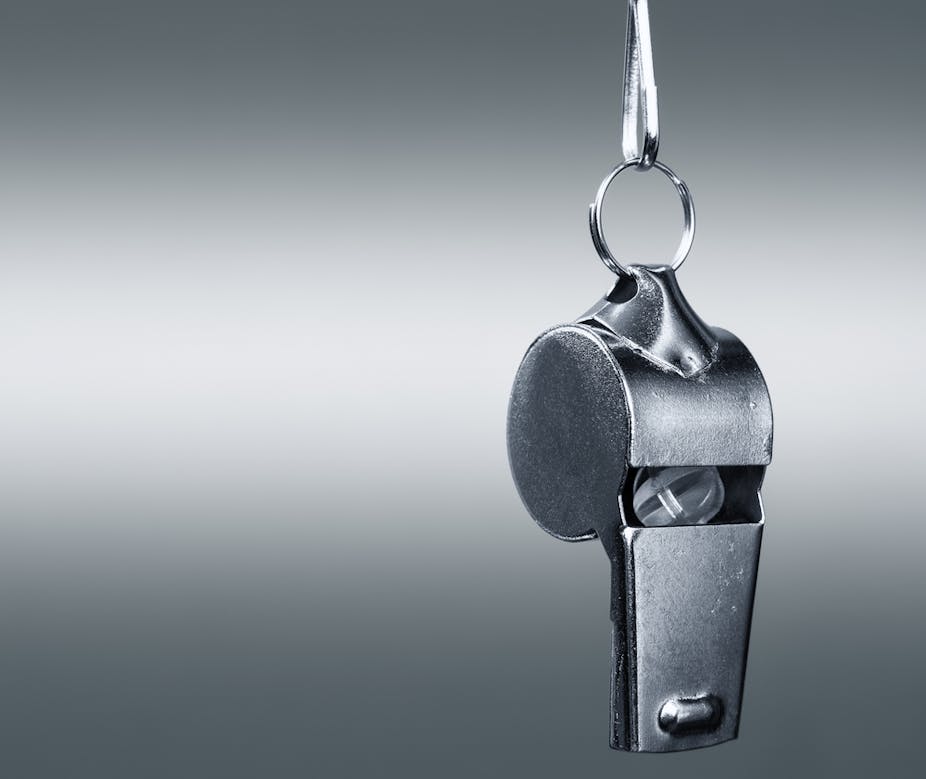After six different parliamentary committees over 20 years, and commitments from all sides of politics, the test is now on for the final week of the current federal parliament.
Federal leaders have certainly talked the talk for some time on whistleblower protection. But will they finally walk the walk?
This week, the Gillard government brought its long-promised Public Interest Disclosure Bill 2013 up to scratch. After extensive amendments introduced by attorney-general Mark Dreyfus, the bill will establish the most comprehensive protection regime for public sector whistleblowers in Australia.
The amendments passed the House of Representatives, so it is now up to the Senate.
There are still gaps in the scheme – especially lack of protection when public officials report wrongdoing by politicians, and significant exclusions for intelligence agencies. These gaps must be filled in time, along with the yawning gap that remains for whistleblower protection in the private sector.
However, in all other circumstances, if federal public servants, contractors, and employees of contractors report wrongdoing within the Commonwealth public sector, they will receive a historic level of protection.
The attorney-general also announced this week that he supports unification of the nation’s different “shield laws” for journalists, enabling them to protect the identity of confidential sources if called on to name whistleblowers in court. But that’s something this government may or may not get to do, depending on the September election.
What this parliament can do, in the next week, is finally enact a long overdue law to directly protect federal whistleblowers themselves. On this issue, Dreyfus’ amendments involve a huge shift from the government’s original bill. The position was going to be that before a public servant’s external disclosure was protected, the internal investigation would have to be so bad that “no reasonable person” could conclude it was adequate. That was an impossibly high test.
Now, the bill instead proposes that – subject to other public interest tests – it is enough if the whistleblower themselves believes “on reasonable grounds” that the first investigation or response is inadequate.
That is just one of many improvements giving the Dreyfus scheme a chance of working to encourage internal disclosures, get them properly investigated, and reduce the likelihood of whistleblowers suffering reprisals.
The bill is also the first national law in the world - following in the mould of the Australian Capital Territory’s legislation - to embed reprisal risk assessment and prevention obligations in the government’s internal integrity systems. It means better management and protection of whistleblowers must start from the moment they first reveal their concerns about wrongdoing to a supervisor, manager, or internal “authorised officer”.
To back this up, the bill follows international best practice by giving whistleblowers access to the Fair Work Act to get remedies if mistreated by their employer – the first time whistleblower protection has been embedded in Australian workplace law.
In a world first, it also introduces a new “public interest” legal costs regime in support of whistleblowers who can’t or don’t access the Fair Work regime. This means whistleblowers can recover their legal costs along with compensation if they show there was a reprisal, but are not stopped from making claims by the risk of having to pay their employer’s costs if their claim fails.
Together, despite the gaps, this means the bill would finally fill one of the largest holes in our federal public integrity system. It has been promised by the Australian government for years, most recently in order to also comply with the United Nations Convention Against Corruption (UNCAC), and the G20 Anti-Corruption Action Plan.
The need is crystal clear. In 2008, a Australian Research Council-funded [study](http://epress.anu.edu.au/titles/australia-and-new-zealand-school-of-government-anzsog-2/whistleblowing_citation](http://epress.anu.edu.au/titles/australia-and-new-zealand-school-of-government-anzsog-2/whistleblowing_citation) revealed reporting by employees as the single most important way that wrongdoing in government is brought to light. However, fewer than 2% of whistleblowers received formal support and protection.
Further research in 2012 revealed that while 80% of Australian employees feel personally obliged to blow the whistle on wrongdoing in their organisations, only 49% feel their managers would be serious about protecting them – and the figure in 2008 was only 33% for federal public servants.
The research has already informed law reform in Queensland, NSW and the ACT, as well as the Public Interest Disclosure (Whistleblower Protection) Bill 2012 introduced by independent MP Andrew Wilkie in October – an important step in ensuring that the government brought on its own bill.
Wilkie showed clearly that it did not have to be as hard as the government was making out. Previous private members bills were also introduced by the Greens and the Democrats, but all lapsed.
The test is now on. Can this historic step finally be taken?

